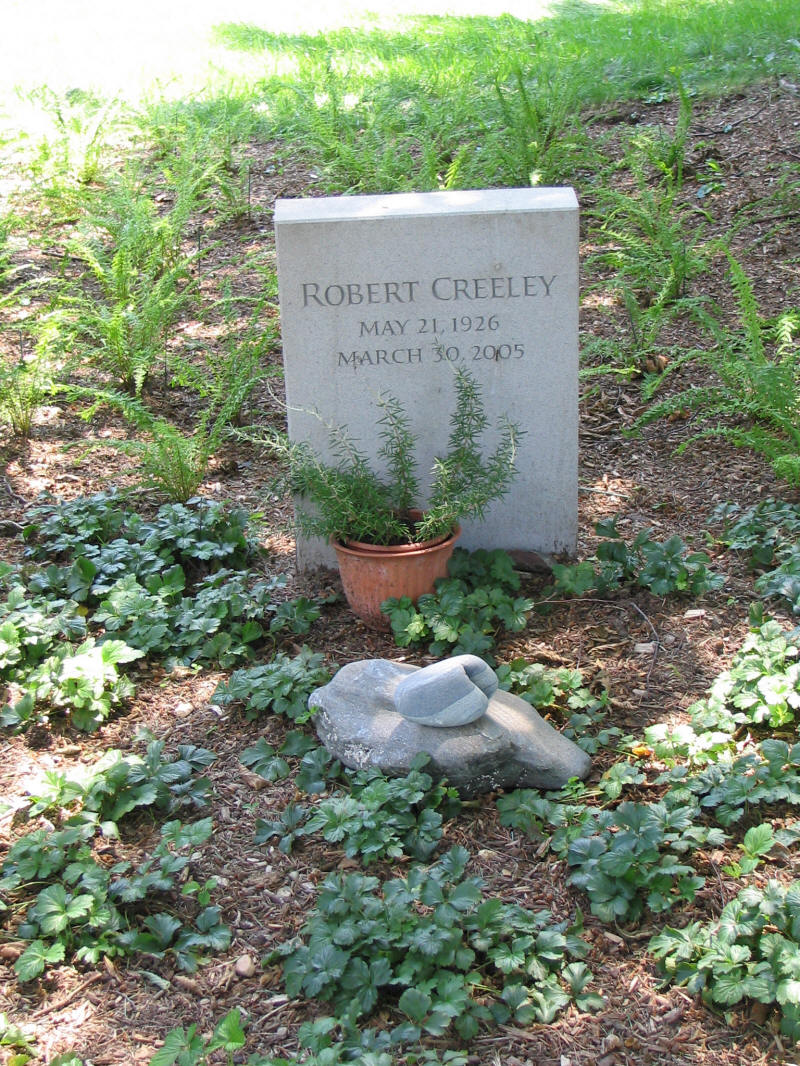If you set a Google Alert for the name Robert Creeley, one thing you will discover fairly quickly is that there are quite a few blogs and a growing number of Flickr! pages that tend to post snippets of literature as daily words to live by, rather in the manner of homilies on page-a-day calendars. And that Robert Creeley is becoming something of a favorite for this kind of use. I have no idea how long these sites stay up, nor how many of the upwards of 180,000 websites that mention Creeley they might account for. But there do seem to be a couple of new ones every single day.
This is, of course, a traditional use of literature, not so far removed in its historical context from the sort of use implied in the idea that high school students memorizing & reciting poetry is a “good thing.” Both are a far cry from the conception of poetry as “news” advocated by William Carlos Williams, and are in fact profoundly pre- if not outright anti-modern (let alone postmodern) notions. They recreate a world prior to the invasion of technology (or, for that matter, electricity) into the home. They’re one step removed from using the Bible for these exact same purposes, and it’s noteworthy that the advocates for a federally funded project like Poetry Out Loud don’t advertise the original role of such recitation as an important stepping stone along the path toward a secularized enlightenment. Recitation not only meant that literature was replacing the Bible as a template for living and source of information, but also brought literature to the event’s listeners, many of whom were not yet literate.
I tend to think of such literary projects as the true flarf of our time, since both public recitation and the idea of poetry as homily seem deeply committed to the most sentimental notion of writing one could imagine. Which is why I think it surprising to find somebody so thoroughly identified with the postmodern as Creeley being adopted in such a premodern manner. It’s not that one can’t find instances in his writing that might not be amenable to such use – more than a few readers complain of Creeley’s sentimentality in his later writing – but generally what I see on the web these days are the early poems, especially those from For Love, being yoked to this purpose. How ironic, given Creeley’s own comment upon sentimentality in the poem from which that volume takes its title:
For love – I would
split open your head and put
a candle in
behind the eyes.
Nor is Creeley alone in this predicament – what exactly was the meaning of Ron Padgett on Prairie Home Companion a few weeks back?
It’s hard not to see the sentimentality in some of these circumstances. Consider this promotional framing that came in an email I received Friday from PBS Newshour, promoting a story it planned to do last night on poetry. What follows is verbatim:
*MOTHER'S DAY POETRY
As part of our ongoing NewsHour Poetry Series, tonight we look at (poet) Frances Richey.
The Iraq War has divided many Americans including Frances and Ben Richey. Ben, a graduate of
I don’t want to make light of the sacrifices and risks experienced either by Ben or his mother. But at what level is their experience being converted by poetry into the television equivalent of greeting card sentiment? And to what degree is poetry simply being (mis)used by PBS? Those are not easy or automatic yes-or-no questions. I don’t think Creeley’s “I Know a Man,” for example, ought to be read in this fashion, and yet I can see that some people are doing just that.
Whenever we see poetry being equated with sentiment and sentiment equated with responses to military intervention, as with the Richeys, it’s hard, frankly, not to remember that schmaltz was the aesthetic preference & sentimentality the preferred emotion of the Nazis. Or, for that matter, how these same phenomena contributed also to Stalinist social realism. This isn’t a left/right question so much as one of totalitarian psychology per se. Sentimentality is the quintessential totalitarian emotion.
Poetry can be the linguistic equivalent of weight training – an experience of language in all its resistance, a world in which “more difficult” does in fact mean “better.” Or it can be hollowed out in service entirely to the referent, an almost weightless domain of “experience.” Whenever the latter happens, however, social institutions (including those that replicate themselves inside of us) institute an almost automatic hierarchy of such experiences & emotions. This is why it’s so easy for people to falsify memoirs of dark beginnings & upward striving. We want to believe. We want to think that poetry can heal the rift between mother & son, even in the light of a conflict started under false pretenses with no clear goal or end in sight. But no amount of poetry is going to solve the problems of
The question I have isn’t about Frances Richey or Robert Creeley or Ron Padgett, who are being used for the agendas of others, so much as it is why are we seeing this resurgence, right now, of totalitarian framing on the part of NPR, PBS and the National Endowment of the Arts? And why do we see it burbling up like so many toadstools along the riverbanks of the Web?
for
christ’s sake, look
out where yr going.






